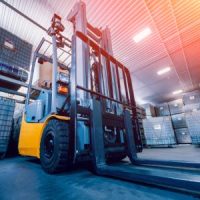Causes of Forklift Accidents in the Workplace

Forklifts are widely used in several industries to carry and move loads. Examples of industries that use forklifts include construction, warehousing and distribution, manufacturing, agriculture, mining, and logistics and transportation industries. Unfortunately, as it is with other heavy machinery, forklift accidents do happen. Forklift accidents can result in serious consequences. These accidents can cause severe injuries and even death. Therefore, it is crucial to take steps towards preventing forklift accidents. While forklift accidents are impossible to predict, they can be prevented if the proper steps are taken.
The first step towards preventing forklift accidents in the workplace is understanding the common causes of these accidents. In this article, we discuss some of the common causes of forklift accidents in the workplace;
- Insufficient Training
One of the leading causes of forklift accidents in the workplace is insufficient or improper training. Safely operating a forklift requires a specialized skill set that can be acquired through comprehensive training. OSHA requires forklift operators to be trained on, among other things, operating principles, safe load handling, and emergency protocols.
- Speeding
Forklifts are designed for precision and power and not for speed. Forklifts do not operate like other vehicles. These machines have a high center of gravity and narrow wheelbase, which increases the risk of tipping over, especially when an operator goes at a high speed. Speed can also lead to an operator losing control of the forklift, resulting in a collision with other vehicles, objects, or people. Additionally, operating a forklift at a high speed reduces the operator’s reaction time.
- Faulty Machinery
Lack of regular maintenance can lead to mechanical failures, resulting in serious injuries or even death. Forklifts should be maintained regularly. Regular maintenance of forklifts is a proactive way of ensuring the machinery is safe. Regular maintenance makes it possible to identify and address mechanical issues on time.
- Improper Loading
Loading issues are another major cause of forklift accidents in the workplace. First, it is crucial to avoid overloading forklifts. An overloaded forklift can tip over due to a shifted center of gravity. Second, loads should be properly secured. Failing to secure the load properly on a forklift can cause the load to slide off or result in the forklift tipping over. Additionally, when placing loads on forklifts, it is vital to balance the load correctly. An imbalanced load can cause a forklift to become unstable and tip over.
- Ignoring Safety Protocols
Safety rules are only helpful if people respect them. Not adhering to the established safety protocols increases the risk of forklift accidents. Examples of safety rules that are sometimes ignored include speed limits and load capacity.
- Poor Workplace Design
Poor workplace design can increase the risk of forklift accidents. For example, congested workplaces and narrow aisles make navigating and maneuvering forklifts safely challenging, increasing the risk of accidents.
- Driver Inattention
Operating a forklift while distracted can result in serious accidents. Distractions can lead to, among other things, overlooked hazards and delayed reaction times.
In the event that you suffer an injury as a forklift operator, you may be eligible to file a workers’ compensation claim. Workers’ compensation is meant to compensate workers who suffer work-related injuries.
Legal Help Is Available
Our Vermont workers’ compensation attorney at Sluka Law PLC has years of experience helping injured employees recover the workers’ compensation benefits they deserve. We are here for you if you need us.
